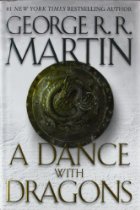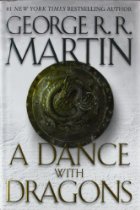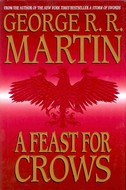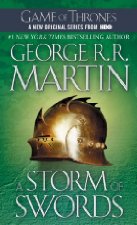Title: A Dance with Dragons
Author: George R. R. Martin
Publication Date: 2011
LC Call Number: PS3563 .A7239
Okay, so here’s my attempt at an actual serious post about A Dance with Dragons. I don’t feel like I have a lot to say about it, so, we’ll see.
The book is mostly not about what is going on in Westeros; it’s about the effect that Daenerys has had upon the countries in the east. Most significantly, it’s Daenerys vs. slavery. The ideology here is really difficult to pin down; the book appears to contain a deep ambivalence, if not toward slavery itself, toward the possibility of abolishing it politically.
There will always be problems in these chapters caused by the fact that they are narrated and perceived exclusively by characters from Westeros. Daenerys believes, at least for a while, that she is able to solve the problems of all these cities she knows nothing about just with her own power. This is a narrative we find all the time; privileged people with a Eurocentric (perhaps not the right word here?) viewpoint figure they can fix things for people who have darker skin, live elsewhere, have customs they consider barbaric, etc, and it’s been pointed out by much better writers than I am how a subtle racism can underlie benevolence of this sort. Now, because Martin has so many different viewpoint characters and is so willing to live in their heads that it’s never really clear what is the bias of the characters and what is the tendency of the book. This, by the way, is one of the things that really gets lost in the HBO series, and an important reason that the tv show makes me feel more uneasy about the story as a whole. So you have characters who position themselves like this and it’s sometimes left ambiguous whether this is endorsed. However, the weakness here is that you never have an point of view character who provides a perspective that would help us understand, for instance, what life is like for a freedman in Meereen.
However, we do get a first hand view of slavery. First, Daenerys explicitly reminds us that her crusade against slavery is a product of personal experience, refuting invalid analogies with the simple statement, “I have been sold.” One might think her longing for Drogo at the end of the book (and I’ll admit, I find this bizarre) would weaken this argument a little, but I do think it’s important that she recognizes her suffering as such, remembers that Viserys was not her friend, and knows that what happened to her was wrong. I wrote before about the lack of any solidarity, anywhere in these books–Daenerys is as close as it gets, but notice that this is not real solidarity because she still believes that she is a queen and holds herself above those she has freed. This is what leads her to make compromises with slavers, and it’s basically the Mirri Maz Duur problem all over again. She shares none of the specific circumstances of any of the people she is trying to help, and although some of them end up fairly close to her–Missandei and to a lesser extent, Grey Worm–there’s never a sense of what she can learn from them.
We do get a more–typical?–view of it from Tyrion and Penny. Penny, by the way, is a great character and was sorely needed in this book. She is a second dwarf, so that we can have a different perspective on dwarf-ness than the one that Tyrion provides. She’s a commoner, which alleviates the problem I discussed in my earlier post about the series’s increased focus on the major players, and she is a survivor who does not concern herself with maintaining her dignity. With Penny, we get a sense of the relationship between the common people and the aristocrats in this world. She views the “big folks” as rather dangerous natural forces which she must appease in order to be allowed to continue to live her own life and tend to the things she cares about–her (now deceased) brother, her pets, her own continued existence. She has learned their ways and believes that she mostly understands how to conduct herself around them. She will follow these rules in order to ensure her safety; her plan is to survive rather than to rebel. It is not a particularly heroic nor philosophical worldview, and Tyrion’s thinly-veiled contempt for her is a constant reminder of that. In a way, it leads me to wonder whether we are supposed to look down on her as well, and I worry about how she will be portrayed in the TV series. Still, given her social position, gender, and size, it’s been a pretty smart strategy, it’s led to her surviving this long, it harms no one, and it’s hard to blame her for it. Frankly, if you dislike Penny, I think you are kind of a jerk.
In any case, she and Tyrion are captured and sold as slaves, in the midst of the camp in which everyone is dying of the flux. This gives us a first-hand view of the lives of slaves, although a view that is acknowledged as atypical, and the book really needed that. Tyrion and Penny do almost an Ariel/Caliban thing; Tyrion is resistant and insulting and Penny is compliant and sweet and even a little bit loyal, but curiously, it is Tyrion who tries to find some justification for their situation. He observes at one point that the lot of most slaves, in his opinion, is no worse than the lot of servants in Westeros, and later reflects that being a slave is a choice because those enslaved have not forced their captors to kill them. Both of these thoughts tend to absolve the powerful from responsibility–maybe, instead of expecting slaves to rebel, people shouldn’t go around making others into slaves in the first place? Maybe servants in Westeros shouldn’t be treated like slaves? Maybe the existence of an analogous situation elsewhere doesn’t actually mean slavery is okay? And what does Tyrion know about the lives of servants, anyway? But of course, Tyrion is a displaced aristocrat, if a rebellious one, and while he often appears to take the part of people of lower classes (in this book, he is careful to take the blame for vomiting on the floor so that the slave in the brothel won’t be blamed for it–a jarring gesture when, as far as I can tell, he has just raped her, but that is this book all over) , he still sees all this from a distance and doesn’t really identify with it. He is disgusted with Penny because she does, and she tries to roll with the punches, but although she is naive and has less overall awareness of the situation than he does, she understands that part of it better. But Tyrion is a dangerous character to make these observations, because he is the smartest character in the series, and the most entertaining. When he says this sort of thing, the reader is tempted to agree with him automatically, and I’m not sure that it is really explicitly presented as being part of Tyrion’s development rather than an exposition on What This Book Thinks About Slavery. And yet, at the same time, it gives me the opportunity to read generously and attribute it to Tyrion. I am not sure whether I am being too generous or not, nor how this my affect other readers.
In any case, a lot of page time is given to those who argue that slavery is an economic necessity, and while I am not convinced that we are supposed to buy this, it is enough to make us uneasy about Daenerys and her project. Of course, there are flashes of insight from elsewhere, too. I enjoyed the moment at which it is revealed that the slaves of Volantis are waiting for her to come. In this moment you see that slavery is not sustainable, that getting rid of it isn’t just a whim of Dany’s, and that maybe it isn’t all about her anyway–that slaves have agency. But they are waiting, which is perhaps disappointing. Maybe in Book Six, if it ever comes out, we’ll see independent revolts happening all over the place. That would be fun.




